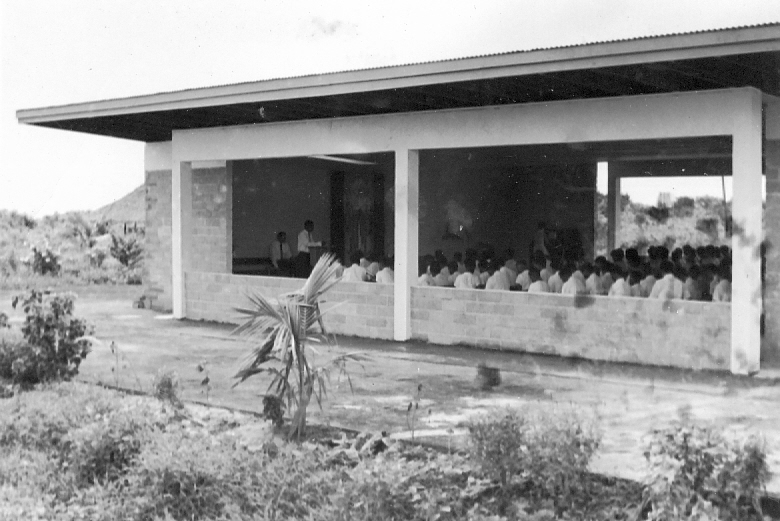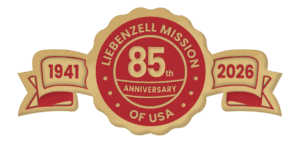War drove missionaries from Manus Island, but the church they planted persevered.
Excerpted from an interview with Jonah (also spelled “Jona Pokaro”) by Norman Dietsch at Dariu Village, 1976. Translated from Pidgin to English by Norman Dietsch.
It was in 1919 that the white men came. I was in my village. I did not go to the Station [the Government Administration Headquarters on the coast].
I heard that they had come. It was the year 1919 that the Kiap [government official, either Patrol Officer or District Commissioner] came to our village. When we saw him for the first time, we were afraid and ran into the bush. We saw they had a strange kind of skin. It was like the skin of the Masalai [believed to be evil spirit creatures in the jungle]. From the time the Germans came until the time the Australians replaced them, we feared these men who had skin like the Masalai.
[In 1921, Jonah began working for the government station on Manus in order to raise money for the new government tax, and then worked on a coal ship. In 1932, he contracted with Liebenzell missionary Friedrich Doepke doing construction and carpentry at the Lugos Mission Station and church. He also became captain of the big mission canoe that provided transport between many islands.]
Jonah’s Eyes Opened
At Lugos [Mission Station] was a small man from Sapon whose name was Pokoroki. I did not know how to read or write. At night he took a slate and a slate pencil used by the children and he began teaching me to write. It was not very long, perhaps two or three weeks, that I was able to write on paper.
Now about reading — everyone sang from a church song book and they read Bible texts in our language. I saw the children reading, of the age of Pokoroki. I, now, had a great desire to read, but how could I do it? I found a young man from Sirrah, whose name was Kailo. I asked him: “Cousin, I would like you to teach me some words in the book. I heard your singing. It was really very nice. I would like very much to sing, too. But I cannot read.” He said: “These are not legends from our language. These words are from the book called the Bible. It is from the book where God has spoken. It is Him you must ask. When you pray to Him, He will show you His words.” I listened to what he said and asked: “How could I talk to Him?” He replied, “Go to your dormitory where you sleep; sit down in your room and open this Bible book, which is in the Tingau language. In the afternoon fold your hands, kneel down and pray to Him saying, ‘Father, this message of yours, I would like to read it.’ When you are finished you will be able to read. I cannot help you to understand these words; they are not our words, they are the words of the great Lord.”
”These words are from the book called the Bible. It is from the book where God has spoken.
It was this man, Kailo, from Sirrah village who told me to take the Bible to my room. No one else was in the dormitory. I began to read and prayed, but my eyes did not understand the words, not even a little. I thought, “Why did the man fool me?” I went outside and sought out Kailo saying to him, “Cousin, you spoke and I did what you said, but I did not see to read.” He said, “Alright, true, but go and try again.” I did again what he told me. I went to the room and prayed, three times, then thirty times, I prayed and prayed, now my eyes were opened and I could read this book.I remember to this day what happened back then, and I think of this man. Just today [in 1976], I saw him on his way to Lorengau. Every time I see him, I look into his face and tell him: “I am so very happy about you. When you were still a boy in school you told me of this Word and I came to trust in the Lord. For three days I prayed in the room in the dormitory where I slept. I read the words of the Bible in our language. It was then that I thought deeply about these things.”
1942 — Japan Invades
[…] In 1942, I was still at Lugos. A time of trouble came. Fighting and war broke out. The Japanese dropped bombs. Why did they come? The bombs killed one man at Buliso; his name was Bopoke. A bomb fell on Lugos killing a huge pig. This pig was a boar. The Japanese occupied Manus and we were handed over to the Japanese. They attacked, landing with a strong force, thousands of warships, and airplanes. Lorengau, Momote, Lombrum, and every island was filled with Japanese soldiers.
It was now March. The Japanese soldiers arrived. They took all the missionaries, all the pastors, Mr. Salin, another named Krani, Mr. Masis and another working for the company [plantation owners and managers]. All were taken and interred at the mission station.
About two years before this, Mr. Walter [a Liebenzell missionary] was imprisoned in Australia. All the missionaries were placed in the big house of Mr. Doepke. In the night, all the missionaries were together, the Roman Catholic priests together with Mr. Doepke, Mr. Gareis, and Miss Molnar.
They cried aloud, they cried to God, they prayed and prayed. About 5:30 in the morning, soldiers came to take them to a boat. We took a big canoe, took everyone and brought them to Lorengau. They were taken to the location where now the meeting place of the Jehovah Witness is located. There was no bush there; it was cleared and a big building housing Japanese soldiers was placed there. The missionaries and others were kept prisoner there. It became 7:00 in the morning, and they were imprisoned without getting any food. All day they remained until 5:00pm, when a boat came.
When the soldiers came to take them, [the missionaries] shook hands with words of encouragement, saying to us, “You will remain, we will go. God is with us. You stay and God is with you.” As [Mr. Doepke] spoke these words a branch of the tree near the church, which we called Pok, broke. They left.

Japanese warship, the Akikaze.
They were transported to a warship [the Akikaze]. They were all killed. This I did not see, I saw only that they were transported to the warship. We left them and returned to Lugos.
Now, we returned to Lugos. All were gone. At the house we began to cry for sorrow. Finally, we slept. It was now about 5:00 in the morning, when about 400 Japanese soldiers marched on to the property. They loaded their rifles and locked bayonets to their rifles. We were still sleeping as they surrounded all the houses, and they cut down the coconut trees and the citrus trees, they cleared all the flowers and bushes; they smashed down and destroyed the chicken shed, the duck shed, the pig hut, and the sheds for the goats and sheep. Everything was in ruins as if a strong tide had come and swept away everything in its path. When we awoke we saw destruction everywhere, where the four hundred soldiers swept through Lugos. We were in fear, and the root of our fear was that the missionaries had been killed and now we would be killed, too. We were sorely afraid, for we saw the devastation around us.
[…] We did not abandon worship or praying during this time. We had worship each evening, each morning; each morning and each evening. If the Japanese soldiers came to Lugos, they beached their boat at Pasai. I held worship services. One day after I preached, and after we prayed and after we sang, we went out from the church, and a soldier stood by the Laulau tree observing us. “Oh, good afternoon, Lugos is number one. Ah so, Christians are number one.” He came to shake hands with us. We talked a bit. After some talking, I told the schoolboys to get some laulau (oranges), and give them to the soldiers. “Go to the chicken house and bring them some eggs,” I said. It was to please them, and so they returned to Lorengau.
”We did not abandon worship or praying during this time. We had worship each evening, each morning; each morning and each evening.
We had church services non-stop until 1943. At the end of 1943, I sent word to the villages for them to bring one thousand taro, bring some “kabul” (couscous) and prepare them for the cooking pit. I then got two pigs for everyone. We killed them and put them in a cooking pit. It was a Christmas feast. When everything was cooked, all was taken out of the pits and was lined up on two long beds prepared for the feast. There was taro and pig. When all was lined up, I took a Pidgin English hymn book I had hidden and we sang hymns. While we were singing, Japanese soldiers came and gathered around us. They took the hymn book saying, “Give this book to us, we want the songs in the book to come to us, we want the book.” I said, “Sorry, there is only one book, it belongs to me. I use it help all my students.” They listened to what I said and the book stayed with me.

The church at Lorengau on Manus Island.
Ways to Give
Liebenzell USA began in 1941 under difficult circumstances and the turmoil of World War II. The ongoing pandemic has created difficult times for our ministries as well. As we celebrate our 80th anniversary, we appreciate your help in rebuilding from the aftermath of the pandemic — so we can enter our next year, and decade, strong.




